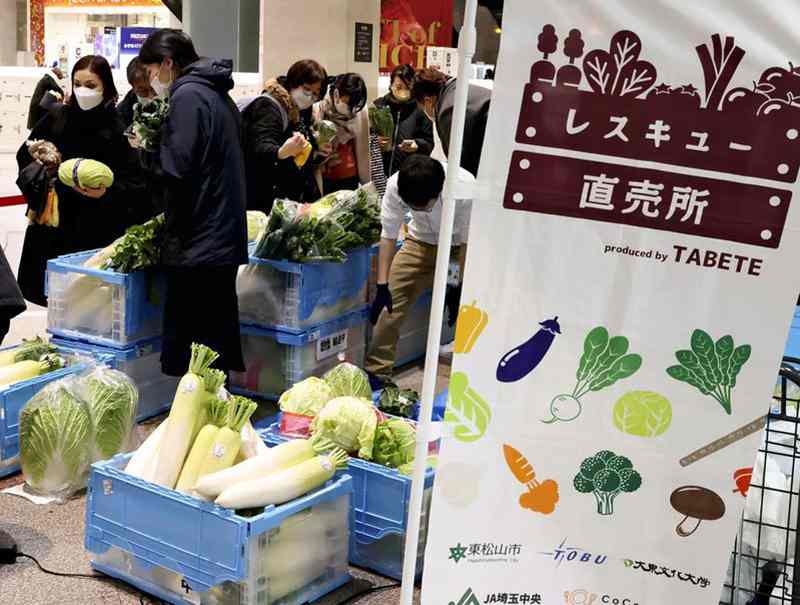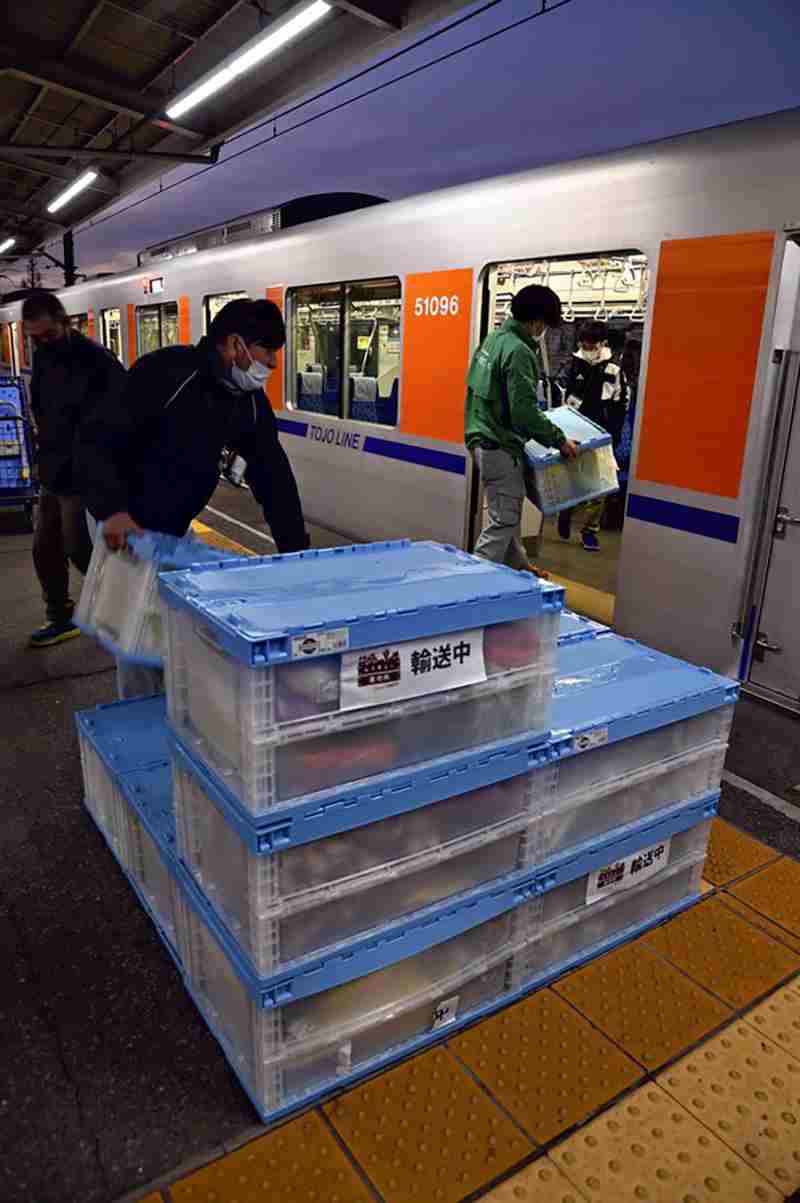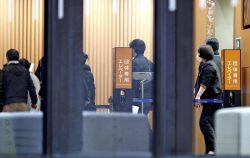
A farm stand at Tobu Railway’s Ikebukuro Station is crowded with people buying vegetables on their way home in Toshima Ward, Tokyo, on Dec. 20.
14:06 JST, December 27, 2021
As part of efforts to “rescue” food from going to waste, some railway companies have started selling fresh but unsold vegetables and other foods at stations, targeting people on their way home from work.
The companies are also hoping to improve their corporate image by contributing to the Sustainable Development Goals.
Tobu Railway Co. has teamed up with several organizations to start a project to reduce the amount of food wasted because of its expiration date.
At 6:30 p.m. on Dec. 20, fresh vegetables such as hakusai Chinese cabbage, daikon radishes and negi green onions were laid out in front of the south ticket gate of Ikebukuro Station on the Tobu Tojo Line in Toshima Ward, Tokyo.
The veggies were unsold items from five retailers in Higashi-Matsuyama, Saitama Prefecture, and other areas. The project is called “Rescue Chokubaijo,” with chokubaijo meaning farm stand, and saves agricultural products that are about to be discarded.

JA Saitama Chuo branch employees load vegetables onto a train in Namegawa, Saitama Prefecture, to transport them to Ikebukuro Station.
The project is operated by Tobu Railway, CoCooking Co. in Minato Ward, Tokyo — a company that operates the Tabete app aimed at reducing food waste — and the JA Saitama Chuo branch, among other organizations.
The vegetable market has been open on Mondays, Wednesdays and Fridays, excluding holidays, since March.
“This is a very good initiative. The vegetables are cheap and delicious,” said Masayo Suganuma of Kita Ward, Tokyo, who often visits the stand.
Since its opening, the rescue stand has sold about 14 tons of produce. The amount of produce disposed of in the city has been reduced to less than half. “I am glad that produce grown with care by local farmers is not wasted and is brought to people’s tables,” a city official said.
Fewer passengers
It all started when the city of Higashi-Matsuyama consulted CoCooking. Local farmers markets attract lots of customers in the morning. But even though producers knew that there would be products left unsold in the evening, it was difficult to sell them all. In that case producers have had to take them back and dispose of them.
The city came up with the idea of taking the products to the city center and selling them.
The city then consulted Tobu Railway, the only railroad that runs through the city. The railway firm has been experimenting with transporting goods in vacant spaces on trains, after the number of passengers decreased amid the coronavirus pandemic. The firm agreed to transport the veggies and provide space to sell them at the station.
“It’s not directly related to profits, but we accepted the request after learning that this local government along the railway line needed help,” said Masaru Maruyamatani of Tobu Railway’s sales department.
According to the Agriculture, Forestry and Fisheries Ministry and other agencies, the amount of food waste generated nationwide is approximately 5.7 million tons per year.
Half of this is food that remains unsold at restaurants and stores or is discarded because of its impending expiration date.
If food can be transported to a place where people gather after business hours, like Rescue Chokubaijo, there is a good chance of finding new customers.
“We can only do this with the cooperation of the railroad company. It will also be an opportunity for passengers using the station to think about food waste,” said CoCooking President Kazuma Kawagoe.
Products from stores
Similar efforts have started in various places. Tokyu Railways ran a trial at Nagahara Station in Ota Ward, Tokyo, from Dec. 13-23, selling products that remained unsold at a supermarket in the station and stores nearby such as a coffee shop and a bakery. They were sold at discounted prices to passengers from 9:30 p.m.
Since most of the nearby shopping streets close around 7 p.m., the farm stand placed in front of the ticket gate is crowded with people on their way home from work.
“As we sell our products later in the day, we don’t have to compete with retailers along the line. We would like to examine the results of this project and consider the possibility of introducing it at other stations,” an official of Tokyu Railways said.
At the end of October, three vending machines were installed in the vicinity of Nagoya Station, allowing customers to purchase products at a discount when they are about to expire.
Venture company Minatoku, based in Taito Ward, Tokyo, operates the vending machines, which sell sweets, bread, cup noodles and other items at a discount of 30% to 50%. “We want to expand our areas of business along railway lines and in commercial facilities and increase the number of our vending machines to 500 in three years,” the firm said.
Top Articles in Society
-

Man Infected with Measles Reportedly Dined at Restaurant in Tokyo Station
-

Man Infected with Measles May Have Come in Contact with Many People in Tokyo, Went to Store, Restaurant Around When Symptoms Emerged
-

Woman with Measles Visited Hospital in Tokyo Multiple Times Before Being Diagnosed with Disease
-

Australian Woman Dies After Mishap on Ski Lift in Nagano Prefecture
-

Foreign Snowboarder in Serious Condition After Hanging in Midair from Chairlift in Nagano Prefecture
JN ACCESS RANKING
-

Japan PM Takaichi’s Cabinet Resigns en Masse
-

Japan Institute to Use Domestic Commercial Optical Lattice Clock to Set Japan Standard Time
-

Israeli Ambassador to Japan Speaks about Japan’s Role in the Reconstruction of Gaza
-

Man Infected with Measles Reportedly Dined at Restaurant in Tokyo Station
-

Videos Plagiarized, Reposted with False Subtitles Claiming ‘Ryukyu Belongs to China’; Anti-China False Information Also Posted in Japan





















